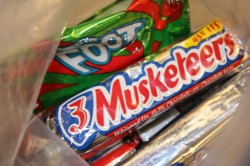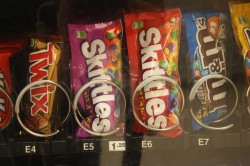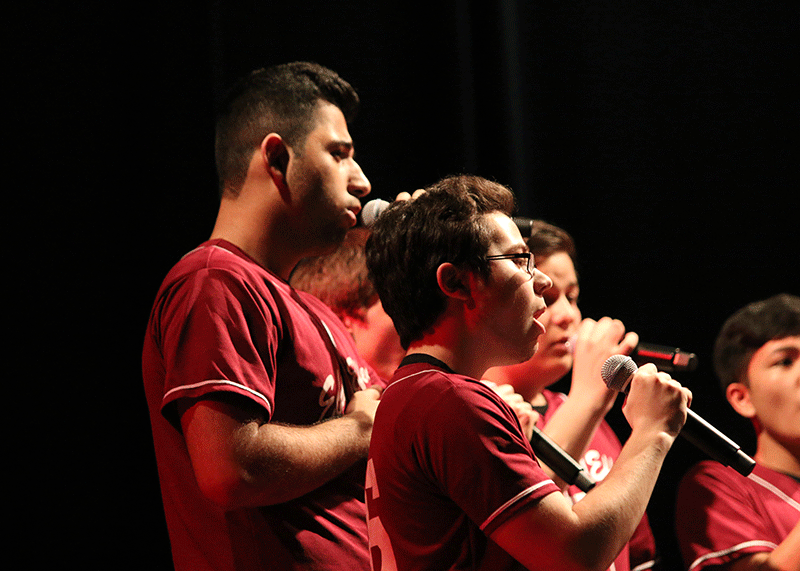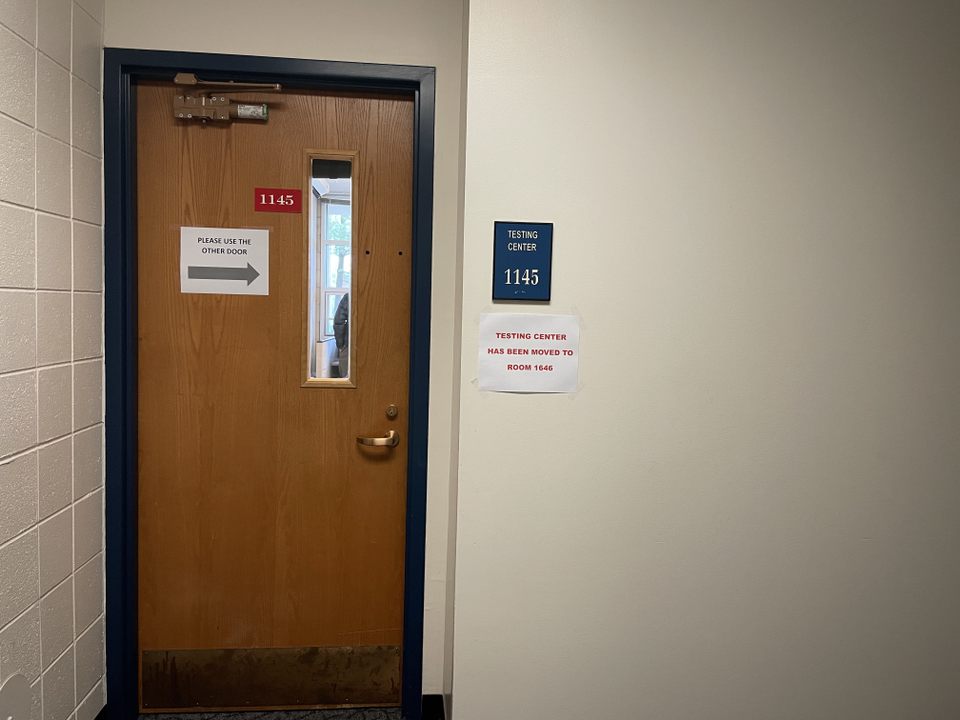
First it was regular pop; then it was curly fries; next on the chopping block? Candy and other sugary treats.
According to community relations director Jim Szczepaniak, District 219 is now considering regulating or banning the sales of candy and other sweets at West and Niles North.
Currently, students can only purchase diet soda and juices in the cafeteria; however, in the hallways and classrooms, they can buy cans of Coke and candy bars. The school board and district intend to clarify these inconsistencies sometime in the near future.
“The district recognizes that we are sending mixed messages in our schools. Among the issues that the Board of Education and administration are looking at is whether to regulate or ban the sale of sugar-filled items and other unhealthy items. The district does not want to encourage eating unhealthy foods,” Szczepaniak wrote in an email.
According to principal Kaine Osburn, student government representatives met with six board members today, and the issue of banning candy sales was brought up by Nick Flatley, senior class president.
“The board heard loud and clear the concerns about candy sales and fundraising abilities,” Osburn said. “Board President Silverman did voice some concern about curtailing student choices in an extreme way. Board member Sheri Doniger assured the student representatives that their concerns would be incorporated into any decision and no drastic changes would occur overnight.”
If the selling of candy is terminated, some students said they will be upset.
“People will be mad. Candy is good,” said sophomore Alex Fraas.
Other students said students will generate other methods of eating their favorite foods in class.

“Kids will bring their own candy probably,” said freshman Logan Fogg.
Although candy is sold mostly for fundraising purposes, the school board has other reasons to eliminate candy selling.
“Research shows that eating a healthy, balanced diet is critical to learning. We know that, if students are not properly nourished, they will not be ready to learn and their academic performance will suffer. We also know that when students load up on junk food, they cannot maintain focus and are more likely to behave disruptively,” wrote Szczpaniak.
Some students said they feel otherwise.
“[The school board] shouldn’t [ban candy selling] because it’s mostly for good causes,” said Fraas.
“[Banning candy] is wrong. What else are [clubs and activities] going to sell?” said junior Gaelyn Bailey.
Student activities director Jessica Ogulnik said if the district bans candy sales many clubs and activities will be hurt.
“A big, huge part of their incomes will be cut,” she said. “Most clubs do candy or bake sales as fundraisers.”
Ogulnik also said students need to take their health into their own hands.
“I feel that sugar isn’t always the best, but I think it’s our job as a school to educate kids on how to make choices. Taking away options isn’t teaching,” she said.
In addition to candy, the district plans on improving the cafeteria food. On June 30, 2012, Niles West’s contract with Aramark, the catering company, will expire, and the school board has started creating a request for proposal (RFP) and plans to send them out to multiple companies.
The school board will take advantage of the opportunity to change some of the foods that the school provides to satisfy the consumers and their desired health goals.
“The district does not currently have a written philosophy about food in our schools, but we are seeking to develop some policies and guidelines that will reflect our growing concern about the critical role food plays in the health of our school community and students’ ability to learn,” Szczepaniak wrote.
In an NWN poll, 52 percent of the 333 people who took “Do you like the new ‘healthier’ food options in the cafe?” voted, “No, most of the food is overpriced and disgusting.” Even so, 38 percent voted, “Yes, I want to eat healthy.”

Regardless of health, some students said they still want the curly fries and regular pizza back:
“[The cafeteria food] is disgusting. They try to make it healthy by using wheat. It’s not healthy, and it’s not good,” said Fraas.
“It doesn’t taste all that good to be honest. The pizza is greasy and the dough doesn’t taste good,” said Bailey.
“[Bring] curly fries back. They’re good,” said Fogg.
Health and physical education teacher Heidi Splinter said the improvements are a start, but the students need more choices.
“I know [the district] is trying, but they can do a better job bringing in healthier food options,” she said.
According to Szczepaniak, the school board has a responsibility to provide healthy lunches to the students.
“Three out of 10 students in District 219 qualify for free or reduced-price lunch, and it is our responsibility to provide those students, as well as all our other students, with healthy, nutritious food offerings,” wrote Szczepaniak.
Some students, however, said the food is a bit overpriced.
“[The food] is kind of expensive,” said Bailey.















Cristina Castro and Madeleine Schmidt • Nov 19, 2010 at 12:23 PM
We agree that candy is really bad for students and it does interrupt with students’ learning. However, we agree with Becky that it will cut main money source for Dance Marathon Charity . If the board could come up with better items to sell to students, then we would definitely stop selling them. We try to sell healthier foods like granola bars, but barely anyone buys it. It is the students’ decisions and right to buy whatever they want. We agree on selling healthier food if only people would buy it. Also, Dance Marathon have been trying different fundraisers to lessen the unhealthy eating. Even if they ban candy sales, students will find ways to get their sugar! Basically, it is not a smart decision and it’s a mistake. As students are supposedly eating healthier, clubs and other activities are suffering. This is not a good price to pay. We sell candy for a good cause.
Mr. O • Nov 15, 2010 at 11:07 AM
Certainly, fund raising is a major issue. So is the proliferation of candy sales and its effect on health and education. However, at the student government’s breakfast with the board, school board member Sheri Doniger made clear that no drastic changes would be occurring anytime soon. As changes take place in the cafeteria and vending machines, I am sure the board will have the administration monitor those changes and continue to listen to students about candy sales and the like. Ms. Doniger didn’t promise that candy sales would be here forever, but that they would not disappear overnight and realistic options will be explored with the students before any changes are made.
Lyba Zia • Nov 14, 2010 at 6:52 PM
The board met with some students from West on Wednesday morning and they agreed on keeping the candy. 🙂
dabche1 • Nov 13, 2010 at 10:56 PM
I agree banning candy will affect the revenue of clubs, but I like the idea of banning candy. Candy is bad. There is no nutritional value in eating candy, therefore candy serve no purpose. Clubs need to stop being selfish by whatever it takes to raise money for their respective clubs. They need to consider the negative effects they are implementing to the student body. There needs to be change. Change in fundraising methods. I’m sure there are other creative ways to raise money than selling candy. Selling candy, everyone does it. It’s time for a change. Why not just ask people for donations? Go canning? I was able to raise seventy bucks for Volleyball in two hours by just asking people for donations. People are nice and they want to help.
Other ideas on the spot:
i. Instead of candy why not sell nutrition bars like Cliff bars or Cereal bars
ii. Host an event, like Indo-Pak they host a basketball tournament
iii. Hat day?
iv. Car wash (in good weather months)
v. Movie night
vi. Some sort of Auction. Any artist out there who have artwork just lying around?
vii. Holiday related décor for ex: Thanksgiving: baked goods, like pie? (Baked goods should be allowed to an extent) Winter holidays: X-mas, x-mas cards, small ordainments wreaths. Valentine day, enough said be clever.
Less candy machines and more of those fridge machines that sell cold goods like yogurt, fruit, milk, etc. Lowering the prices of healthier options will surely encourage this change to eating well. For example, those cups of carrots and celery ranch are $1.25. That’s ridiculously overpriced. I get roughly 6-8 pieces baby carrots, and 6-7 pieces of celery. A 2-lb bag of baby carrots from Dominick’s is $1.50 and a bunch of celery $0.99. The price of healthier options are more expensive than the food options, and I feel that is part of the reason why kids choose to buy candy because it convenient and less expensive.
Candy should be banned, baked goods maybe to an extent, promote healthier choices.
~Semper Fi
Becky Darling • Nov 12, 2010 at 8:50 PM
As a Dance Marathon Executive, I think that putting a ban on candy would seriously diminish the revenue for our charity. Candy makes up the majority of each dancer’s 100 dollars therefore they may not be able to raise the amount required. I also agree with Ms. Ogulnik, in that our clubs and activities would not be able to do as much as they do now without their fundraising. Therefore i believe that a school wide ban would not be beneficial to anyone because the students would just bring junk food from home.